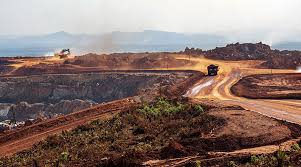Training Course on Environmental Impact Assessment (EIA) for Oil and Gas Projects
Training Course on Environmental Impact Assessment (EIA) for Oil & Gas (O&G) Projects equips professionals with the latest tools, strategies, and regulatory frameworks to evaluate and mitigate environmental impacts throughout the O&G project lifecycle.

Course Overview
Training Course on Environmental Impact Assessment (EIA) for Oil & Gas (O&G) Projects
Introduction
Training Course on Environmental Impact Assessment (EIA) for Oil & Gas (O&G) Projects equips professionals with the latest tools, strategies, and regulatory frameworks to evaluate and mitigate environmental impacts throughout the O&G project lifecycle. This high-impact course blends global best practices with real-world industry case studies, ensuring participants are prepared to conduct effective EIAs in compliance with national and international standards. By integrating environmental sustainability, project risk assessment, and regulatory compliance, this program enhances operational efficiency while reducing ecological footprints.
The O&G industry faces increasing pressure from governments, stakeholders, and the public to uphold environmental integrity. This training provides a robust foundation in EIA procedures, environmental risk management, and stakeholder engagement. Participants will learn how to develop and apply effective environmental management plans (EMPs), comply with ESG (Environmental, Social, and Governance) mandates, and conduct strategic environmental assessments (SEA) tailored to complex oil and gas infrastructures including upstream, midstream, and downstream operations.
Course Objectives
- Understand the fundamentals of Environmental Impact Assessment in the Oil & Gas industry.
- Apply EIA regulations, procedures, and standards in energy infrastructure projects.
- Identify and mitigate environmental risks in petroleum operations.
- Develop effective Environmental Management Plans (EMPs).
- Analyze biodiversity and ecological impact in oil and gas projects.
- Conduct baseline environmental studies and data collection.
- Implement stakeholder engagement and public participation strategies.
- Perform cumulative impact assessments across project phases.
- Address climate change risks and GHG emissions in project planning.
- Integrate ESG compliance into project reporting and assessments.
- Apply international EIA frameworks such as IFC, UNEP, and World Bank standards.
- Understand strategic environmental assessment (SEA) for long-term planning.
- Evaluate case studies of successful EIA implementations in O&G projects.
Target Audiences:
- Environmental Engineers
- Project Managers in Oil & Gas
- Compliance & Regulatory Officers
- HSE (Health, Safety, Environment) Professionals
- Environmental Consultants
- Government Regulators & Planners
- ESG & Sustainability Professionals
- Academics and Researchers in Environmental Science
Course Duration: 5 days
Course Modules
Module 1: Introduction to EIA and Regulatory Frameworks
- Definition and history of EIA in global context
- Key stages of the EIA process
- Legal and regulatory frameworks (national & international)
- Importance of EIA in sustainable O&G development
- Overview of EIA tools and reporting formats
- Case Study: Implementation of EIA in a deep-water drilling project
Module 2: Environmental Baseline Studies & Data Collection
- Designing baseline data surveys
- Tools and techniques for field data collection
- Data analysis and interpretation for EIA reports
- Importance of socio-economic and ecological baselines
- Mapping sensitive environmental receptors
- Case Study: Baseline study of an offshore LNG facility
Module 3: Impact Identification, Prediction, and Evaluation
- Tools for impact prediction (e.g., matrices, GIS)
- Quantitative vs qualitative impact assessment
- Ranking and significance of identified impacts
- Modeling emissions and discharges
- Cross-sectoral impact linkages
- Case Study: Predictive analysis in a pipeline project
Module 4: Environmental Management Plans (EMPs)
- Components of an EMP
- Mitigation and monitoring strategies
- Roles and responsibilities in EMP implementation
- Emergency response and contingency planning
- Indicators for performance measurement
- Case Study: EMP design for a gas processing plant
Module 5: Stakeholder Engagement and Public Participation
- Stakeholder identification and mapping
- Communication and consultation tools
- Conflict resolution in EIA processes
- Addressing local community concerns
- Regulatory requirements for public hearings
- Case Study: Community engagement in a refinery expansion
Module 6: Climate Change, GHG, and Cumulative Impact Assessment
- Integrating climate change in EIA
- Measuring and managing GHG emissions
- Cumulative impact assessment tools
- Adaptation and resilience strategies
- Environmental offsets and carbon credits
- Case Study: GHG management plan in an upstream project
Module 7: ESG Integration and Strategic Environmental Assessment (SEA)
- ESG pillars in oil and gas
- Reporting frameworks: GRI, SASB, TCFD
- Role of SEA in national and sectoral planning
- Linking EIA with sustainability goals
- Monitoring ESG compliance
- Case Study: SEA integration in a national oil strategy
Module 8: Best Practices and Future Trends in EIA for O&G
- Innovative tools: AI, remote sensing, digital twins
- EIA for unconventional O&G projects (e.g., shale, fracking)
- Green project certification and environmental auditing
- Transboundary EIA and regional cooperation
- Post-EIA audits and adaptive management
- Case Study: Digital EIA systems in a multinational oil company
Training Methodology
- Instructor-led sessions with real-life examples and visuals
- Interactive group discussions and simulation exercises
- Hands-on exercises and technical demonstrations
- Case study analysis from actual O&G projects
- Knowledge assessments and certification
- Access to online resource repository and tools
Register as a group from 3 participants for a Discount
Send us an email: info@datastatresearch.org or call +254724527104
Certification
Upon successful completion of this training, participants will be issued with a globally- recognized certificate.
Tailor-Made Course
We also offer tailor-made courses based on your needs.
Key Notes
a. The participant must be conversant with English.
b. Upon completion of training the participant will be issued with an Authorized Training Certificate
c. Course duration is flexible and the contents can be modified to fit any number of days.
d. The course fee includes facilitation training materials, 2 coffee breaks, buffet lunch and A Certificate upon successful completion of Training.
e. One-year post-training support Consultation and Coaching provided after the course.
f. Payment should be done at least a week before commence of the training, to DATASTAT CONSULTANCY LTD account, as indicated in the invoice so as to enable us prepare better for you.